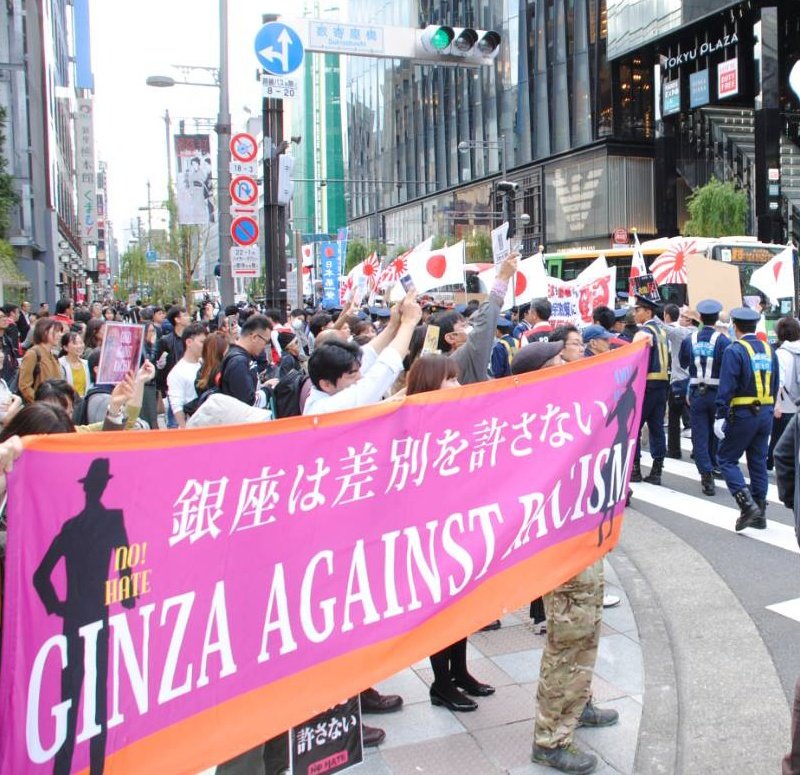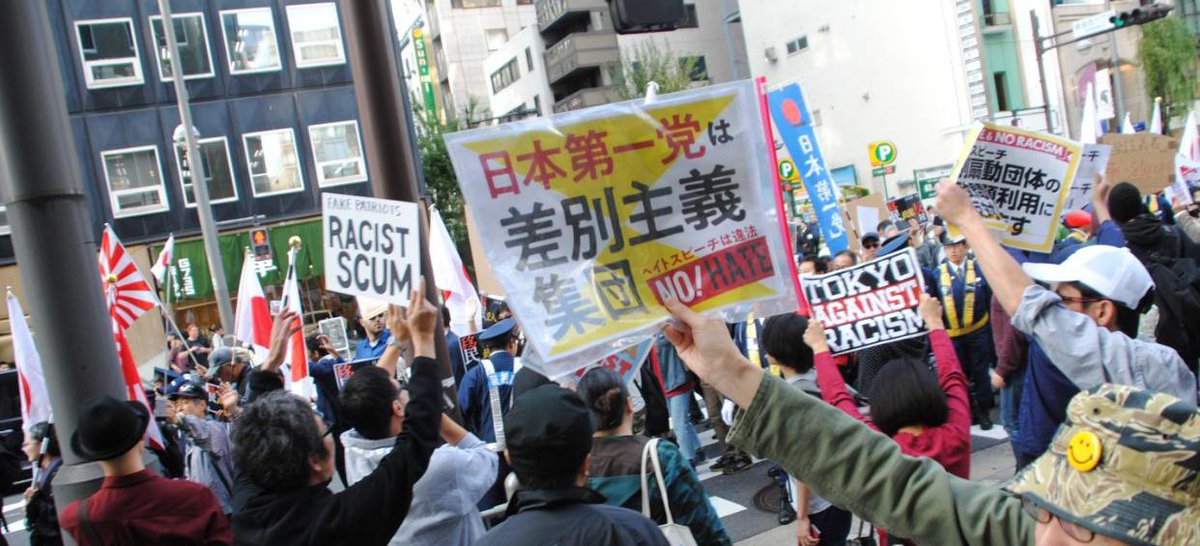Bloomberg
The protests in Ginza the article mentioned seemed like normal nationalist trash but there were a lot of counter protesters.




"eat my ass you racist fucks" is the 2018 response to "white pig go home"
e: For counter protest photos / tweets, see https://twitter.com/hashtag/1014銀座ヘイトデモを許すな
A strict immigration policy has helped make Japan one of the world's oldest and most homogeneous societies. Now, Prime Minister Shinzo Abe's plan to invite as many as half a million foreign workers is testing the country's tolerance for change.
Abe is preparing to introduce legislation to allow migrants to start filling vacancies next year in sectors worst hit by the country's shrinking population. While the government hasn't released a target, local media including Kyodo News have reported numbers that would represent a 40 percent increase over the 1.3 million foreign workers now living in the country.
In a sign of urgency, Abe's government has announced an April start date for the policy before debate has begun in parliament. The proposal is among the first he's seeking to tackle after winning a historic third term as head of ruling Liberal Democratic Party last month, paving the way for him to become the country's longest-ever serving prime minister.
If passed, the legislation would amount to Japan's most dramatic immigration overhaul since the 1990s, when it let "trainees" from Asian nations in the country. Foreigners made up only about about 1.7 percent of the country's population as of April, compared with 3.4 percent in South Korea and about 12 percent in Germany.
Abe got a reminder of the risks Sunday as more than 100 noisy protesters marched through Tokyo's upmarket Ginza shopping district, waving imperial army flags and urging the plan's withdrawal. Although the group was outnumbered by police and pursued by counterprotesters chanting "racists go home," they appeared keen to tap into anti-immigrant sentiments that have bubbled up elsewhere in the developed world.
The organizer calls itself Japan First, in an allusion to U.S. President Donald Trump's "America First" policies.
"Far-right parties have very little support in Japan," said Eriko Suzuki, a professor who researches migration at Kokushikan University. "But there are a lot more people, a kind of reserve army, who are vaguely concerned about admitting foreigners. If the government doesn't put together appropriate policies, that unease will increase."
The risks of inaction could be just as great, as Japan's declining population takes its toll on the economy. In a survey published by the Japan Chamber of Commerce and Industry in June, two-thirds of companies said they were short of workers. The number of companies folding because of a lack of workers jumped by 40 percent in the first half of the financial year, compared with the same period in 2017, according to Teikoku Databank Ltd.
Abe's plan, set to be introduced in the parliamentary session beginning later this month, calls for creating two classes of foreign workers to serve in about 10 as-yet-unspecified industries. Lower-skilled migrants would be allowed to stay for as long as five years and barred from bringing their families. More highly skilled workers could bring family members and stay longer -- potentially gaining permanent residence.
Mikio Okamura, the head of the Tokyo chapter of Japan First, called for the government to spend money on improving pay and conditions for Japanese citizens, rather than relying on foreigners.
"Before you let in foreigners, you should deal with Japan's unemployed. We want them to use tax money to do that," Okamura told Bloomberg News. "Then, we would have Japanese people looking after the elderly. That would be the happiest result for the Japanese and for the foreigners, as well."
Other more mainstream groups have expressed concerns, with Japan's Trade Union Confederation questioning the lack of public debate in a letter submitted to the government in August. The group, known as Rengo, has said that foreign workers shouldn't be accepted without careful consideration.
Nevertheless, their presence will hold down wages, some economists say -- working against Abe's six-year push to raise incomes and fight against deflation. The influx of labor will also hold back necessary progress in improving productivity, said Yoichi Kaneko, a former OECD economist and lawmaker, who now works for an IT firm.
"The labor shortage is a reality, but if you bring in foreigners, working conditions will not improve and the minimum wage will not rise," Kaneko said. "That may be good for companies, but for the workers it's not good at all."
The protests in Ginza the article mentioned seemed like normal nationalist trash but there were a lot of counter protesters.




"eat my ass you racist fucks" is the 2018 response to "white pig go home"
e: For counter protest photos / tweets, see https://twitter.com/hashtag/1014銀座ヘイトデモを許すな
Last edited:

